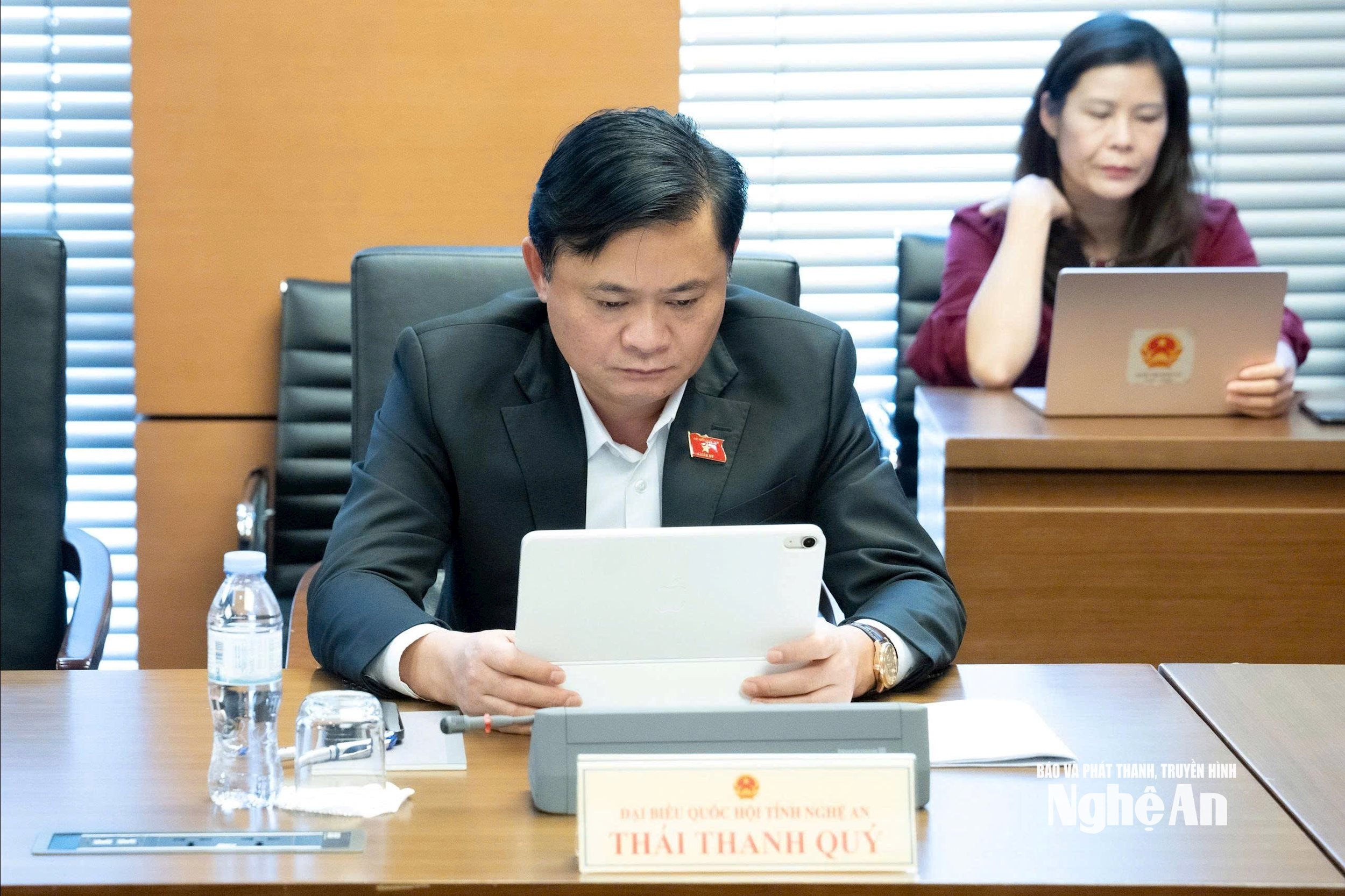The National Assembly delegation of Nghe An discussed regulations on receiving citizens at the commune level.
On the afternoon of November 11, continuing the 10th Session, the 15th National Assembly discussed in Groups about 3 draft laws: Amendments and supplements to a number of articles of the Law on Citizen Reception, the Law on Complaints, the Law on Denunciations; the Investment Law (amended); the Law on Drug Prevention and Control (amended). The Nghe An National Assembly delegation discussed in Group 7 with the Lam Dong provincial delegation.

At the discussion session, delegate Tran Nhat Minh - full-time National Assembly delegate of Nghe An delegation focused on giving comments on the draft Law amending and supplementing a number of articles of the Law on Citizen Reception, the Law on Complaints, and the Law on Denunciation.
He said that the amendments and supplements are necessary to ensure consistency and suitability with the current practice of operating two-level local governments.
Clearly define the form of online citizen reception
Referring to the content of amending and supplementing the Law on Citizen Reception, delegate Tran Nhat Minh expressed his agreement with the addition of regulations on online citizen reception. According to him, this is a necessary step, contributing to promoting digital transformation in citizen reception activities, handling petitions, resolving complaints and denunciations.
However, delegates suggested that the Government should specify the cases in which online citizen reception is applied to avoid abuse in practice. “The goal is to build a modern government model, but at the same time, it must ensure the principle of being close to the people, serving the people,” Mr. Minh emphasized.

The delegate also pointed out some shortcomings in the draft amendment to the Law on Citizen Reception related to the task of advising the Chairman of the People's Committee at the commune level in receiving citizens. According to him, this content is detailed and not consistent with the law-making orientation of only regulating framework issues of a principled nature under the authority of the National Assembly.
He proposed amendments in the direction of stipulating the principle: "The Chairman of the People's Committee at the commune level assigns appropriate units to perform advisory tasks on citizen reception work according to the provisions of law"; the specific organization, assignment or implementation process should be assigned to the Government to regulate.

One point that delegate Tran Nhat Minh paid special attention to was the regulation on the Standing Committee of People's Councils at all levels assigning civil servants to regularly receive citizens. According to him, this regulation is not consistent with the organizational structure and functions of People's Councils and regulations on the management of cadres and civil servants.
“At the provincial level, the assignment of civil servants to receive citizens is under the authority of the Office of the National Assembly Delegation and the People's Council, not the Standing Committee of the People's Council. Because the People's Council is an elected body, it does not have its own team of civil servants. Similarly, at the commune level, the assignment of civil servants is under the authority of the Chairman of the Commune People's Committee according to regulations,” the delegate analyzed.
Therefore, the delegate of Nghe An delegation said that the provisions in the draft Law on this content are unreasonable, will lead to duplication, causing confusion in implementation, because in reality, the locality only has one common citizen reception office; at the same time, the civil servants at the People's Council and People's Committee Offices at the commune level all directly serve the People's Council and People's Committee.
In addition, Mr. Tran Nhat Minh also noted the legislative technical aspect: The current name of Article 22 is "Reception of citizens by the People's Council" but the content of the law does not have any provisions on the People's Council receiving citizens. The Law on Organization of Local Government also does not assign the authority to receive citizens to the Standing Committee of the People's Council but only stipulates the responsibilities of the People's Council delegates. Therefore, the name of the law should be changed to "Reception of citizens by People's Council delegates" to accurately reflect the nature and content.
It is necessary to clearly stipulate the suspension period in handling complaints.
Regarding the amendments and supplements to the Law on Complaints, delegate Tran Nhat Minh highly appreciated the draft for adding provisions on temporary suspension and suspension of complaint settlement. However, he said that the current regulations are still general and lack time constraints.
The delegate of Nghe An delegation commented: The draft only stipulates that when the grounds for temporary suspension no longer exist, the person handling the complaint will continue to handle the complaint. Such a provision is unclear, easily leads to arbitrariness, and affects the legitimate rights and interests of the complainant.

According to the analysis of the delegate, in the three cases allowed for temporary suspension in the draft Law, only one case is due to the complainant's cause (force majeure, objective obstacles). The remaining two cases are related to the responsibility of the State agency, such as the complainant being unable to participate due to force majeure, or waiting for the resolution of another agency.
Therefore, he believes that it is necessary to clearly stipulate the suspension period and at the same time bind the responsibility of the complaint settlement agency in speeding up the processing progress. Otherwise, the suspension may be applied arbitrarily, leading to the complainant's rights not being guaranteed in practice; at the same time, it is necessary to avoid the occurrence of prolonged complaints and limit the shirking of responsibility in the settlement of judgment execution.
On the same morning, the National Assembly held a plenary session at Dien Hong Hall to listen to the presentation and examination reports of the above three draft laws; and at the same time discussed in the hall two draft laws: Civil Judgment Enforcement (amended); Judicial Expertise (amended).
